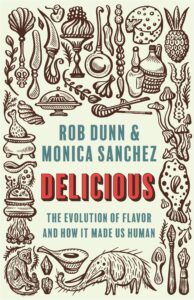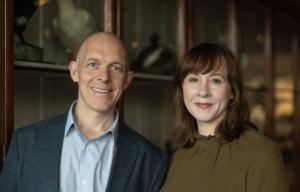North Carolina academics explore flavor
Posted by Elena del Valle on September 29, 2021
Photos: Princeton University Press
Do humans and other animals prefer to eat foods that taste good when they have a choice? Rob Dunn, a professor of applied ecology at North Carolina State University, and Monica Sanchez, a medical anthropologist, think so. In Delicious The Evolution of Flavor and How It Made Us Human (Princeton University Press, $27.95) they explore the history of man, our ancestors and fellow primates and its relationship to flavor.
The authors, speaking in a single voice in the book, believe taste receptors have driven animals and humans toward their needs and kept them away from dangers such as poisonous plants and rotten foods. Flavor preferences may have driven the development of tools and the choice of foods that prompted evolutionary changes, they propose. Aromas sensed in the mouth by primates and humans may have been especially important in the evolution of our kind, they believe.
Rob Dunn and Monica Sanchez, authors, Delicious
Some of those flavor preferences may have driven humans and neanderthals to hunt mega fauna to extinction. They also discuss the consumption of fruit, spices, meats and grains by our ancestors and their possible reliance on their noses and mouths in their choices and creation of spiced dishes and fermented foods. They delve into issues such as aroma, taste and mouthfeel and how they might have led to the development of popular foods such as curry, stinky tofus and cheeses.
In their book Dunn and Sanchez often refer to and quote the work of French lawyer Jean Anthelme Brillat-Savarin, famous for his love of food, dating back to 1825. The 279-page hardcover book published this year is divided into nine chapters: Tongue-Tied, The Flavor Seekers, A Nose For Flavor, Culinary Extinction, Forbidden Fruits, On the Origin of the Spices, Cheese Horse and Sour Beer, The Art of Cheese, and Dinner Makes Us Human.
According to their book biographies Dunn is in the Center for Evolutionary Hologenomics at the University of Copenhagen. Sanchez studies “the cultural aspects of health and well-being.” They live in North Carolina.











